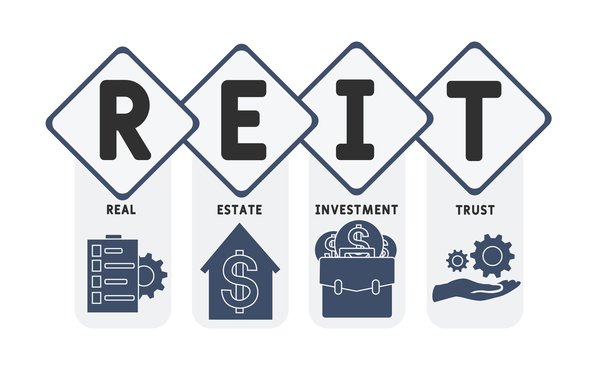Real estate has historically been an excellent investment. It has traditionally delivered competitive long-term returns compared to stocks, generally produces steady income, and is an excellent hedge against inflation. Most financial advisors recommend their clients have some exposure to commercial real estate in their portfolios.

There are many ways to invest in real estate. One of the simplest to gain broad exposure to the entire sector is through mutual funds that invest in real estate investment trusts (REITs). A REIT mutual fund aims to deliver above-average performance compared to an index fund focused on REITs or a REIT ETF. It also offers the simplicity of a single investment instead of having to buy and manage shares of several different REITs.
Here's a look at some of the best REIT mutual funds to buy.
Best REIT mutual funds in 2024
Hundreds of mutual funds own shares of mortgage and equity REITs. That provides investors with lots of potential REIT mutual fund investment options.
However, some REIT mutual funds have stood out over the years for their ability to consistently produce above-average returns. Here's a look at five of the top REIT mutual funds that investors should consider:
| REIT Mutual Fund | Ticker | Assets Under Management | Description |
|---|---|---|---|
| Baron Real Estate Fund | (NASDAQMUTFUND:BREF.X) | $1.4 billion | The fund invests broadly in real estate, focusing on growth. |
| Cohen & Steers Real Estate Securities Fund | (NASDAQMUTFUND:CSEI.X) | $7.4 billion | A fund seeking to achieve a total return by investing in real estate securities. |
| PIMCO Real Estate Real Return Strategy I | (NASDAQMUTFUND:PRRS.X) | $769.8 million | A fund that seeks to maximize the real return. |
| TIAA-CREF Real Estate Securities Fund | (NASDAQMUTFUND:TIRE.X) | $3.1 billion | The fund invests at least 80% of its assets into companies that own significant real estate. |
| Principal Real Estate Securities R5 | (NASDAQMUTFUND:PREP.X) | $5.7 billion | A fund that seeks to generate a total return by investing in real estate. |
1. Baron Real Estate Fund
The Baron Real Estate Fund owns a diversified portfolio of real estate businesses. It focuses on companies with growth potential. As of March 2022, the fund held shares of 53 companies, led by the following five:
- Boyd Gaming (BYD 0.15%): 5.4% of net assets
- Brookfield Asset Management (BAM -0.23%): 5.1%
- Jones Lang LaSalle (JLL -1.21%): 3.9%
- MGM Resorts International (MGM -0.35%): 3.8%
- Marriott Vacations Worldwide (VAC 0.07%): 3.6%
Although none of the mutual fund's top five holdings are REITs, it still has significant exposure to the sector. Specialized REITs make up 8.8% of its assets, residential REITs comprise 6.9%, and industrial REITs are 2.5% of its holdings. Meanwhile, most of its other holdings own significant amounts of real estate.
One thing that stands out about the Baron Real Estate Fund is its performance. Over the past decade, the fund has delivered an average annualized return of 15.1%, significantly outperforming the MSCI US REIT Index and its 8.4% annualized return. The fund also has a five-star rating by Morningstar (MORN -0.99%).
The only potential negative is its expense ratio. At 1.05%, it's a bit high for a mutual fund. However, given its long track record of outperformance, it could be worth the price.
2. Cohen & Steers Real Estate Securities Fund
The Cohen & Steers Real Estate Securities Fund seeks to achieve a total return (income plus capital appreciation) by investing in real estate securities such as common stock, preferred stock, and other equity and debt securities issued by real estate companies. The fund invests in REITs and REIT-like entities.
The REIT mutual fund had 50 holdings as of the end of March 2022, led by the following five:
- American Tower (AMT -3.32%): 11.4% of the fund's holdings
- Public Storage (PSA -1.33%): 7.8%
- Welltower (WELL -0.89%): 5%
- Simon Property Group (SPG -1.43%): 4.7%
- Duke Realty (NYSE:DRE): 4.4%
The REIT offers investors diversified exposure to the entire REIT sector. Its top five subgroups are infrastructure (16% of the fund's holdings), apartments (12%), health care (11%), industrial (11%), and self-storage (11%).
The fund has a solid performance track record. Over the past decade, it has delivered an 11% total return, including its sales charge. That has outpaced the 10% annualized total return of the FTSE Nareit Equity REIT Index. It also boasts a five-star rating by Morningstar.
The fund does have a hefty expense ratio of 1.13%, which could be worth it for investors seeking a highly rated REIT mutual fund with an excellent performance track record.
3. PIMCO Real Estate Real Return Strategy Fund
The PIMCO Real Estate Real Return Strategy Fund takes a unique approach. It provides exposure to a broad REIT index that it enhances with a portfolio of inflation-indexed and other fixed-income securities. The fund’s strategy enabled it to generate a high income yield of 10.7% as of March 2022, making it a potentially attractive option for investors seeking passive income from REIT dividends.
The mutual fund held shares of 47 REITs, led by the following five:
- MGM Growth Properties (NYSE:MGP): 2.4% of the fund holdings
- Invitation Homes (INVH -1.55%): 2.3%
- AvalonBay Communities (AVB -0.96%): 2.3%
- Sun Communities (SUI -1.62%): 2.2%
- VICI Properties (VICI -1.56%): 1.7%
In addition to holding REITs, the fund has long and short positions in several fixed income securities.
The REIT mutual fund's unique approach has paid off for its investors over the years. It has produced an average annual total return of 10.9% over the past decade, beating its benchmark's 9.2% total annualized return.
The fund has a four-star rating by Morningstar. It also has a reasonable expense ratio of 0.85%.
4. TIAA-CREF Real Estate Securities Fund
The TIAA-CREF Real Estate Securities Fund seeks to deliver a favorable total long-term return by investing in the real estate industry. It typically invests as much as 80% of its assets in real estate securities, including companies that own significant real estate assets such as REITs. It will also invest as much as 15% of its assets into foreign companies. The fund also has the flexibility to invest as much as 20% in debt or equity of companies unrelated to the real estate sector. The fund doesn't invest directly in real estate or private REITs.
As of early 2022, the fund had 59 positions, led by the following five:
- Prologis (PLD -0.91%): 8% of the fund's holdings
- American Tower: 5.2%
- Simon Property Group: 5.1%
- AvalonBay Communities: 4.5%
- Equity Residential (EQR -1.62%): 4.4%
The fund has a solid performance track record. It has delivered a 9.9% average annual total return over the past decade, outpacing the 9.8% average annual total return of the FTSE Nareit All Equity REITs Index. The fund boasts a five-star rating from Morningstar. It also has a reasonable expense ratio of 0.62%.
5. Principal Real Estate Securities R5
The Principal Real Estate Securities R5 seeks to generate a total return for investors. It aims to invest at least 80% of its net assets, plus any borrowings for investment purposes, into companies primarily engaged in the real estate industry.
The fund had 45 stock holdings as of the end of April 2022, led by the following five:
- Prologis: 7.6% of the fund's holdings
- Equinix (EQIX -0.27%): 5.2%
- AvalonBay Communities: 5.2%
- Ventas (VTR -1.33%): 4.6%
- Essex Property Trust (ESS -1.23%): 4.6%
The fund has a solid performance record. It has delivered a 9.9% average annual total return over the past decade, edging out the 8.7% average annualized total return of the MSCI US REIT Index. The fund has a four-star rating by Morningstar and a 1.06% expense ratio.
Related real estate topics
REIT mutual funds are an easy way to invest in real estate
REIT mutual funds enable investors to broadly invest in the real estate sector. They provide the opportunity to potentially earn total returns above what an investor could achieve with an index fund. The opportunity makes REIT mutual funds a potentially attractive alternative for investors looking for above-average return potential without investing directly in individual REITs.
REIT Mutual Fund FAQs
What's the difference between a REIT ETF and a REIT Mutual Fund?
Both a REIT ETF and REIT mutual fund hold a portfolio of publicly traded REITs. However, a REIT ETF is an exchange-traded fund (ETF) that trades on a major stock exchange. Because of that, investors can purchase shares through their brokerage accounts. On the other hand, REIT mutual funds typically need to be purchased directly from the sponsor or through a financial advisor.
What's the difference between a REIT Index Fund and a REIT Mutual Fund?
A REIT Index fund is a passive investment that holds the same securities as a major REIT index. They provide investors with returns that match the underlying index minus the fees it charges. REIT mutual funds have an active manager aiming to deliver returns that outpace an underlying REIT index even after factoring in fees.



































